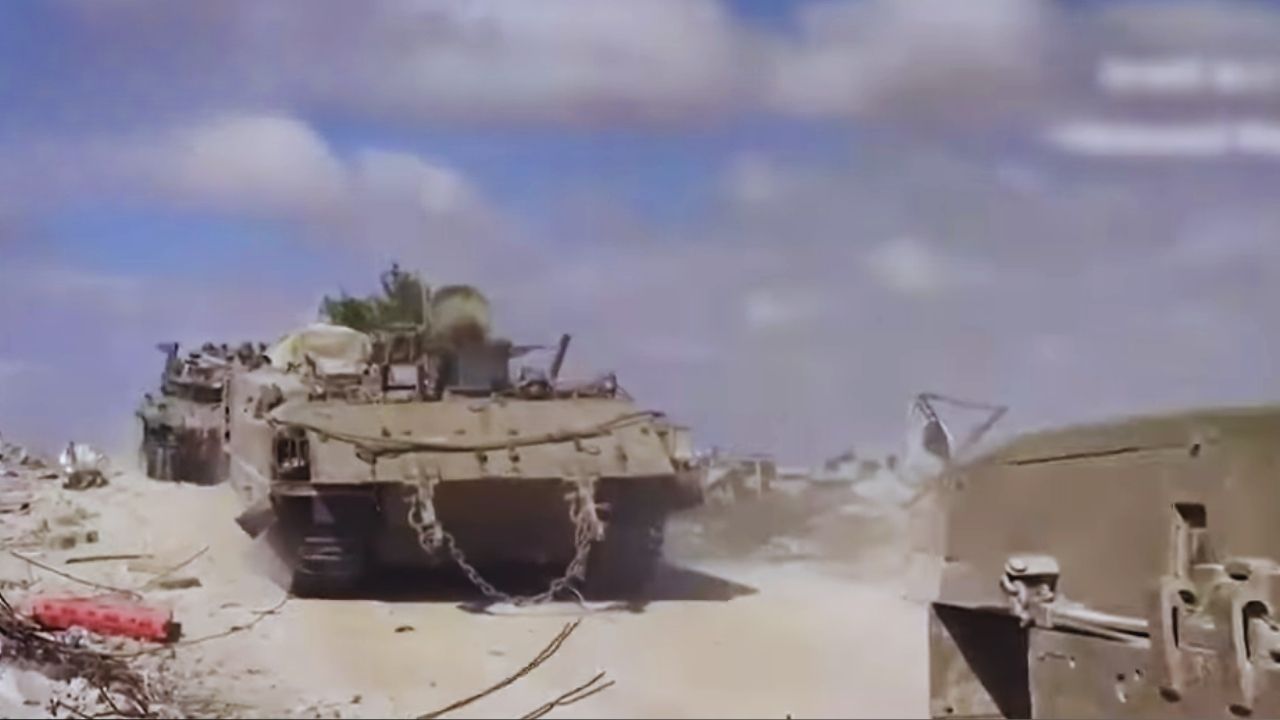As Israel intensifies its military campaign in Gaza under “Operation Gideon’s Chariots,” international outrage is mounting. The governments of the United Kingdom, France, and Canada have jointly issued a stern warning to Israel.
Threatening targeted sanctions if it does not immediately cease its renewed military offensive and unblock the entry of humanitarian aid into Gaza. The situation has prompted global scrutiny, especially as the humanitarian crisis inside Gaza spirals deeper into catastrophe.
What Is Operation Gideon’s Chariots?
Israel’s military operation, dubbed “Gideon’s Chariots,” was officially launched after receiving approval from Israel’s Security Cabinet on May 5, 2025. According to the Israel Defense Forces (IDF), the campaign’s objectives include the complete defeat of Hamas and the rescue of Israeli hostages still believed to be held in the Gaza Strip.
In recent days, the IDF expanded ground operations into both the north and south of the enclave, after conducting days of intense airstrikes. The Israeli military said it had targeted more than 670 Hamas positions across the Strip over the past week alone.
Prime Minister Benjamin Netanyahu escalated the rhetoric on Monday, saying, “We plan to take control of the entire Gaza Strip.”
The ground assault marks a new phase in Israel’s war, which began on October 7, 2023, following Hamas’s surprise attack on Israeli territory. The conflict has since become one of the deadliest in recent Middle Eastern history.
Civilian Toll and Destruction Mounts
Health authorities in Gaza reported that in the past 24 hours alone, at least 136 people were killed, including entire families who died in their sleep as airstrikes leveled residential areas. Among the areas hit was a medical supplies warehouse attached to the Nasser Medical Complex in Khan Younis. The UK-based group Medical Aid for Palestinians (MAP) confirmed the warehouse had been severely damaged.
Since last Thursday, over 400 Palestinians have been reported killed, and more than 1,000 injured, according to a CNN count of data from Gaza’s Ministry of Health. Cumulatively, more than 53,000 people have been killed in Gaza since October 2023, with a majority being women and children.
Humanitarian Catastrophe: Aid Still Blocked
The humanitarian situation in Gaza has become desperate. The territory, home to over 2.1 million people, has been under a near-total Israeli blockade for the past 11 weeks. No food, medicine, or fuel has been allowed in, sparking fears of a full-scale famine.
Under intense global pressure, Israel’s government on Sunday stated it would allow a “basic amount of food” to enter Gaza, citing operational necessity. On Monday, five trucks carrying limited supplies were permitted to cross into the enclave, marking the first such delivery in weeks. However, UN aid chief Tom Fletcher described the shipment as “a drop in the ocean of what is urgently needed.”
Netanyahu has privately admitted that Israel’s international standing—particularly support from its closest ally, the United States—was at risk if the famine worsened. Speaking to the Israeli public, he said U.S. senators and top allies had warned that “if images of mass starvation emerge, we won’t be able to support you anymore.”
UK, France, and Canada Issue Joint Threat of Sanctions
On Monday, the leaders of the UK, France, and Canada released a joint statement strongly condemning Israel’s new military offensive and its continued blockade of humanitarian aid. They stated that if Israel does not stop its assault and permit unrestricted aid access, their governments will be forced to “take further concrete actions,” which could include targeted sanctions against Israeli officials or institutions.
The statement read:
“If Israel does not cease the renewed military offensive and lift its restrictions on humanitarian aid, we will take further concrete actions in response.”
The leaders also emphasized their expectation that Israel comply with international humanitarian law and protect civilian lives.
EU Nations and Global Leaders Echo Concern
In a parallel move, foreign ministers from 23 countries—including Germany, Italy, the UK, and France—along with representatives of the European Union, issued another joint statement demanding Israel resume full-scale humanitarian aid access to Gaza.
They criticized Israel for blocking aid over a prolonged period and pointed to the risk of mass starvation. The statement highlighted that the little aid allowed so far was insufficient and that the blockade was in violation of international norms.
“Food, medicines, and essential supplies are exhausted. The population faces starvation. Gaza’s people must receive the aid they desperately need,” the ministers said.
The Gaza Humanitarian Foundation (GHF): A Controversial Aid Mechanism
The United States and Israel have endorsed a new American-backed NGO called the Gaza Humanitarian Foundation (GHF) to control aid delivery into the territory. Israel claims the foundation is necessary to prevent Hamas from seizing aid for its own purposes.
Jake Wood, the executive director of GHF, said Israel has agreed to allow the foundation to establish two aid distribution points in northern Gaza, with operations potentially beginning within 30 days. However, UN officials and aid agencies have expressed alarm, saying this mechanism risks militarizing aid, and could be used to forcibly displace civilians from northern Gaza.
James Elder, spokesperson for UNICEF, warned that such a system would “weaponize humanitarian aid,” particularly for women and children. Elder and other rights advocates argue that Israel, as the occupying power under international law, is legally responsible for ensuring humanitarian aid reaches civilians.
UN aid chief Tom Fletcher added that there is already a working international aid system and that introducing a separate mechanism is redundant and dangerous.
Trump’s Role and Statements
U.S. President Donald Trump has played a complex role in the crisis. Though he visited Qatar and other Gulf states last week to participate in ceasefire and hostage negotiations, he did not stop in Israel during the tour.
Trump told Fox News that he believes the U.S. should “take over Gaza” and turn it into a freedom zone, a comment that has sparked international debate. He later softened his stance, calling for an end to the “brutal war” and acknowledging the reality of starvation inside Gaza.
Despite criticism, Trump maintained that he was not frustrated with Netanyahu, saying the Israeli leader is dealing with “a tough situation.”
Ceasefire Talks Resume, but Progress Remains Unclear
Indirect ceasefire talks between Israel and Hamas resumed over the weekend in Doha, Qatar. The renewed negotiations reportedly came under pressure from international mediators following Trump’s regional visit.
On Saturday, Hamas-run Al-Aqsa TV announced that talks were underway “without preconditions.” Conflicting messages, however, have emerged from within the Hamas leadership.
One senior Hamas figure told CNN that the group had agreed to release 7–9 Israeli hostages in return for a 60-day ceasefire and the release of 300 Palestinian prisoners. Yet, just hours later, another senior Hamas official, Sami Abu Zuhri, denied any agreement had been made.
Zuhri insisted that Hamas would only release all prisoners if Israel committed to a complete ceasefire under international guarantees, and rejected the idea of piecemeal agreements while military aggression continued.
The crisis in Gaza has now reached a critical juncture. With more than 53,000 dead, infrastructure decimated, and humanitarian aid nearly nonexistent, international pressure is mounting on Israel to shift its approach. While Israel insists on continuing its military campaign until Hamas is eliminated, key global allies—once unwavering—are beginning to push back, threatening diplomatic fallout and even sanctions.
As talks continue in Doha and aid slowly begins to trickle in, the world watches closely. The next few days may determine not just the future of Gaza, but Israel’s standing on the world stage.
The Information is Collected from CNN and NDTV.












































